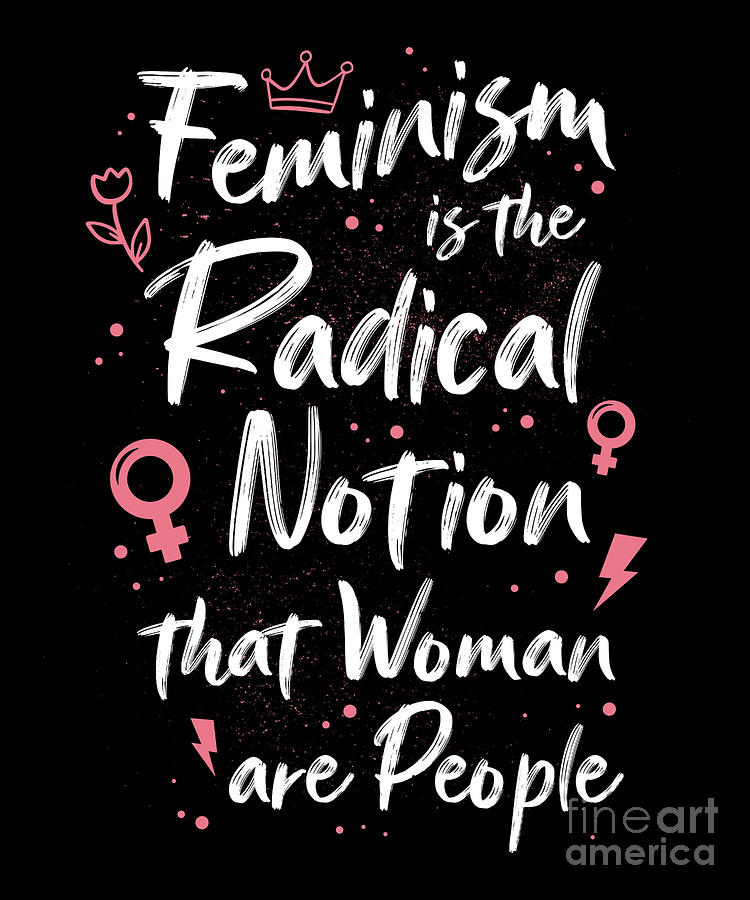Imagine a world where women are not just equal, but where they have complete autonomy over their bodies, their lives, and their futures. This isn’t just a utopian dream; it’s the driving force behind radical feminism. While the term “radical” might evoke images of angry protests and divisive rhetoric, the reality is much more nuanced and deeply impactful. This article delves into the heart of radical feminism, exploring its history, its core beliefs, and its enduring relevance in the fight for true gender equality.

Image: fineartamerica.com
Radical feminism, in its essence, seeks to dismantle the very structures that perpetuate systemic oppression against women. It’s not about simply adjusting the status quo; it’s about dismantling the entire system that has historically marginalized women and pushing for a complete societal transformation.
A Tapestry of Voices and Experiences
The origins of radical feminism can be traced back to the late 1960s and early 1970s, fueled by the burgeoning feminist movement and the seismic social changes of the time. Women, tired of being relegated to the sidelines of power, began to question the very foundations of society, finding the root of their oppression in deeply entrenched patriarchal structures. These early radical feminists, like Shulamith Firestone and Andrea Dworkin, challenged traditional gender roles, argued for women’s complete control over their bodies, and demanded an end to all forms of violence against women.
The radical feminist movement, though diverse in its viewpoints, shares a common thread: a deep commitment to dismantling the structures of patriarchal oppression. This translates into a wide range of activities, from protesting against violence against women and advocating for reproductive rights to exploring the intersectionality of gender with race, class, and sexual orientation.
Beyond the Surface: The Core Principles of Radical Feminism
The power of radical feminism lies in its unwavering commitment to uncovering and dismantling the root causes of gender inequality. Here are some of its key principles:
- Patriarchal System: Radical feminism views patriarchy as the fundamental source of female oppression. This system, ingrained in societal structures, legal frameworks, and cultural norms, privileges men and subordinates women.
- The Personal is Political: Radical feminism emphasizes the interconnectedness of personal experiences with broader political and social structures. It recognizes that seemingly private issues, like domestic violence or reproductive rights, are actually rooted in systemic oppression.
- Women’s Liberation: Radical feminism strives for women’s complete liberation from all forms of oppression, including economic exploitation, social control, and violence. It seeks to redefine women’s roles beyond traditional expectations and empower them to pursue their full potential.
- Sisterhood and Solidarity: Radical feminism underscores the importance of solidarity among women. Recognition of shared experiences and the creation of support networks are essential in dismantling patriarchal structures and achieving collective liberation.
- Intersectionality: Radical feminists acknowledge the interconnectedness of various forms of oppression. They recognize that the experiences of women are shaped by other factors like race, class, sexual orientation, and disability, and fight for a holistic approach to liberation.
Navigating the Complex Landscape: The Controversies and Debates
As with any revolutionary movement, radical feminism has faced criticism and controversy. Critics often point to its perceived radicalism, accusing it of promoting separatism, exaggerating female oppression, and lacking practicality in its solutions. Internal debates, too, have surfaced within the movement, with differences in approach and strategy.
One significant debate revolves around the definition of “woman” and the potential exclusion of transgender women. This complex issue highlights the challenges of reconciling feminist ideals with transgender rights. Others argue that radical feminism neglects the lived experiences of women from different racial, ethnic, and socioeconomic backgrounds, overlooking their specific needs and challenges.

Image: study.com
A Constant Evolution and an Enduring Legacy
Despite these controversies, radical feminism continues to have a profound impact on society. Its principles have inspired numerous social movements and initiatives, pushing for advancements in areas like reproductive rights, domestic violence prevention, and workplace equality. It has also shaped the language of gender equality, emphasizing the need for systemic change rather than merely superficial adjustments.
Contemporary radical feminists are engaging in a wide range of activities to further the movement’s goals. From organizing protests against gender-based violence to promoting intersectional feminism, they are finding new ways to challenge patriarchal structures and advocate for a more just and equitable society.
Embracing the Power of Individual Action
The legacy of radical feminism is not just about large-scale movements and political protests; it also lies in empowering individuals. Here are some practical actions you can take to contribute to the fight for gender equality, inspired by the principles of radical feminism:
- Educate Yourself: Stay informed about the issues surrounding gender equality. Read books, articles, and scholarly works by feminist authors and activists. Engage in critical discussions and explore different perspectives.
- Support Women’s Organizations: Donate to or volunteer with organizations working to empower women and address issues like reproductive rights, domestic violence, and economic justice.
- Challenge Gender Stereotypes: Be mindful of your own biases and challenge harmful gender stereotypes in your everyday interactions. Encourage diverse representation in media, literature, and popular culture.
- Advocate for Systemic Change: Engage in political activism and advocate for policies that promote gender equality. Support legislation that protects women’s rights and empowers them in all spheres of life.
Feminism Radical
Building a Better Future: A Call to Action
Radical feminism is not just a movement; it’s a vision of a more just and equitable world. Through its relentless pursuit of systemic change, it continues to inspire countless individuals and organizations to fight for a future where all genders are free from oppression and empowered to realize their full potential. The journey towards true equality is ongoing, and it demands our collective action and commitment. Let’s embrace the legacy of radical feminism and become agents of change, building a world where gender is not a barrier to freedom and opportunity but a source of vibrant diversity and shared strength.

:max_bytes(150000):strip_icc()/OrangeGloEverydayHardwoodFloorCleaner22oz-5a95a4dd04d1cf0037cbd59c.jpeg?w=740&resize=740,414&ssl=1)




